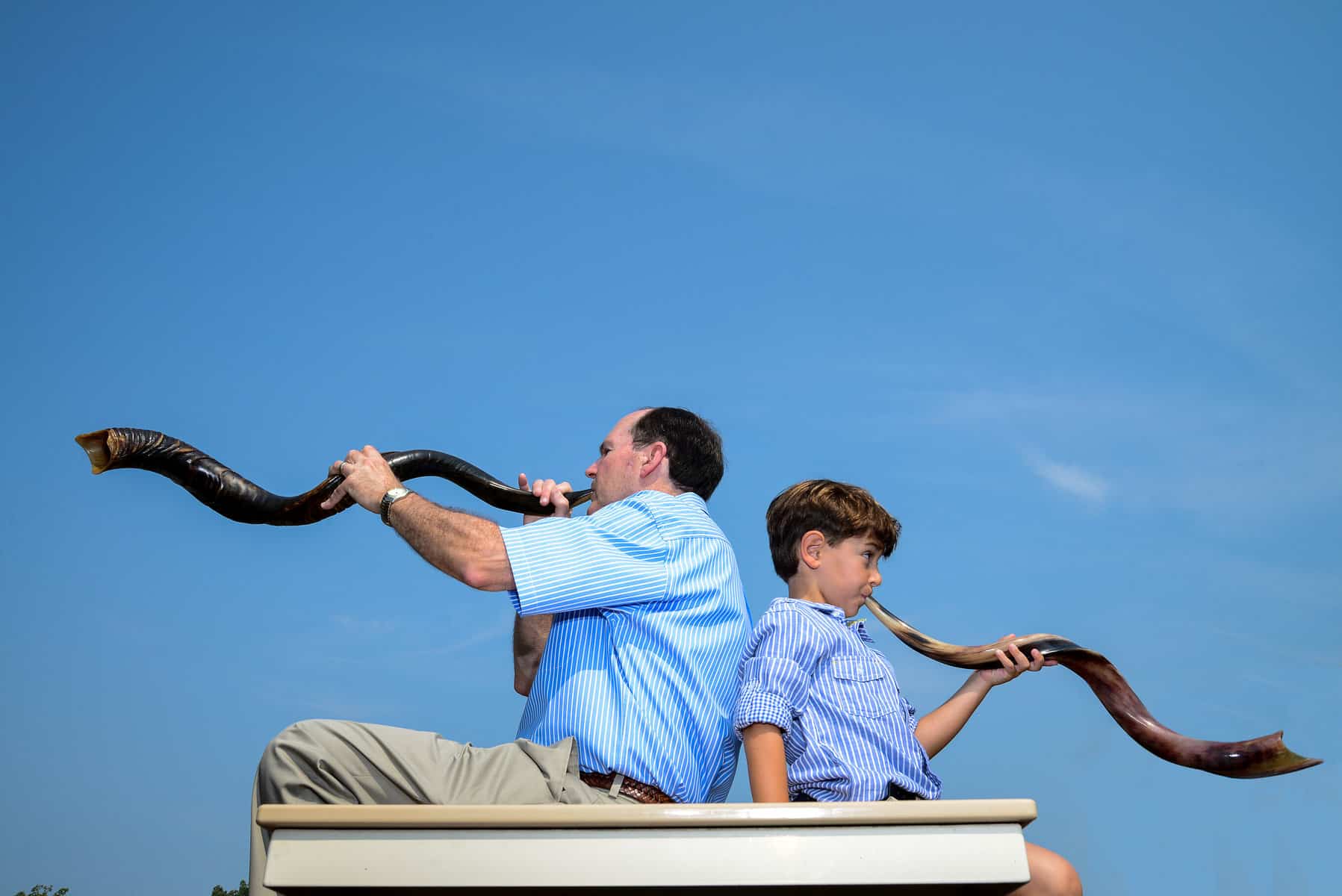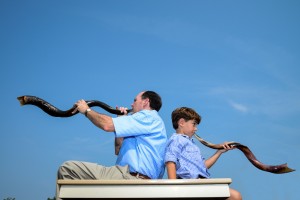It’s a ritual that is both solemn and joyful, that brings musical expression into Judaism. The Jewish News asked local shofar blowers how they got started, why they embrace the tradition, and a little about performance anxiety.
Rabbi Aron Margolin, Chabad of Tidewater
Of all the things we do on Rosh Hashanah, only one of them is an actual mitzvah: listening to the sound of the shofar, which is a call of Teshuvah.
Sounding and listening to the shofar on Rosh Hashanah is our response to the call of shofar, reminding us that now is our time to reset our lives…really returning to G-d, Teshuvah. With this in mind, I taught my children how to blow shofar when they were young so they would have the opportunity to help other Jews by blowing the shofar for them.
The shofar is not really an instrument to create music. The purpose of the shofar is to play a mysterious, ethereal, heartrending note that touches us in our core —to reconnect with our creator. This is the sound of Teshuvah. A factory reset so we can improve.
To understand the depth of meaning I find in blowing the shofar, I have to relate my most meaningful experience with this mitzvah. I merited several years to be present when the Lubavitcher Rebbe sounded the shofar…in Crown Heights, Brooklyn. Thousands of people from all over wrote the Rebbe asking for blessings for the New Year. All these letters and notes were placed in giant brown paper bags on the bima, the Rebbe, his tallis over his head and over the letters. The room, filled with thousands of people, was silent, and you could hear the Rebbe crying under his tallis. After a time, the Rebbe raised his tallis and began reciting the verses we say before blowing the shofar. The Rebbe called out a verse, and the whole congregation in a thunderous response repeated after him, one verse after another. This experience was like a storm: time felt like it had stopped, and we heard the Rebbe negotiating a good New Year. I can’t think of another way to explain it.
These are the emotions I remember and feel again every year as I blow the shofar.
Rabbi Sholom Mostofsky, B’nai Israel
I learned to blow the shofar when I was a young child. My father and brother both blew the shofar for their shul and for people who could not make it to shul on Rosh Hashanah.
The hardest part was learning all the laws and customs that are involved. Altogether, we blow 100 sounds over each day of Rosh Hashanah.
It is very meaningful to me because my father passed away when I was seven years old and since I learned it from him, it always reminds me of him. I hope he is proud of me for continuing in his footsteps.
I have been blowing the shofar for almost as long as I can remember and it is an honor for me to be able to be the bal tokeah (shofar blower) in the B’nai Israel congregation, but it also makes me very happy to go to people’s homes after the conclusion of the prayer service who are not able to attend and blow the shofar for them.
Reuven Rohn, Temple Israel
I learned to blow shofar at age 15 years of age for Young People’s Synagogue at East Midwood Jewish Center in Brooklyn. This is a teen-led service for teens and we needed someone to blow shofar for the High Holidays when the previous person left for college.
The most difficult [part] for me was to get the first sound out. Once I got the technique down, the sequence of the blasts wasn’t as challenging. I get two notes only. Those who [play] trumpet, French horn, or trombone often get more notes, but I was a violinist. [Playing it] is meaningful because the shofar sounds are supposed to be heard by all in the congregation and I am the means by which they fulfill the mitzvah of hearing them.
I am always open to teach others how to blow shofar.
Sam Sachs, Ohef Sholom Temple
I’ve been told that I picked up a shofar at three years old and just started to play.
Since then, I had Marty Einhorn as my mentor. He helped me by teaching me how to change pitch on the shofar, and he encouraged me to take trumpet lessons to improve. Trumpet lessons helped with my lung capacity and ability to change notes.
I think the most difficult part [is] different for different people. For instance, my mom has never even been able to get a note out. Personally, changing notes has been the most difficult part. I am just starting to get the hang of changing pitch in the middle of a particular note, and I’ve been working on it for a decade! Just recently, I have gained the ability to produce three notes in one blow. That is definitely something I am still working on, though.
I practice every day in the month leading up to the High Holidays. For the rest of the year, I focus on trumpet.
This role is meaningful for me because I am able to call all the people in my temple to prayer. I feel I can connect with them, especially because it is such an exciting part of the service. It makes me feel like I can give back to a community that has given so much to me.
This will be the first year that I am blowing the shofar for the temple without Marty [Einhorn] at my side. I have always felt that I gave the temple my all when I blow the shofar, but this year I am hoping to honor him as well. When I blow the shofar in front of people, I definitely feel nervous.
I know the inspiration I would feel when I listened to Marty blow the shofar, and I hope I can provide that for people someday.
Stan Tickton, Temple Israel
When I was a teenager, I played the trumpet and had the right embouchure needed to blow a shofar.
My dad was the organist and choir director at Temple Beth El in Detroit for 56 years and for a number of years I was the assistant organist there in my teens and early 20s. My dad needed someone to blow the shofar for the High Holiday youth services. I did that until 1965. I again blew the shofar at Temple Beth El in 1973 in my early 30s when I was at the University of Michigan in Ann Arbor completing my PhD. In the mid-1970s, the early ’80s, and again in the early 2000s, I was always invited to come into both my children’s and grandchildren’s classes at the Hebrew Academy of Tidewater to demonstrate and explain the shofar calls. In 1988, my dad’s shofar blower quit just before the High Holidays and so I flew back home to Detroit and blew the shofar and again in 1989 a few months after his death.
Aside from belonging to Temple Israel for 48 years, [wife] Carol and I were also charter members of The Tidewater Charuvah where we led High Holiday services for several years along with my blowing the shofar. Over the past few years, Rabbi Michael Panitz has asked me to blow one of the three shofar sets on the second day of Rosh Hashanah.
Also, because we like traveling to Maine and attend services at Congregation Etz Chaim, I was invited in 2016 and last year to blow the shofar.
Having been a trumpet player, there was nothing difficult about learning to blow the shofar or producing different notes. As for knowing when to blow, you just respond to the rabbi’s calls during the Shofar Service.
I do give a few “toots” and practice before the High Holidays. No chance to “warm up” like musicians do before a concert; you have to be able to hit our first note(s) cold. Being part of the High Holiday Services is very meaningful to me since I’ve been doing this since I was a teenager. I don’t feel nervous; that’s probably because I’ve been in broadcasting and mass media since 1957.
Alan Wagner, Congregation Beth El
I grew up in Omaha, Nebraska. Along with other community activities, our family was very involved in the synagogue. We looked forward to Shabbat junior services. They were rowdy and fun even though they were supposed to be “serious.” Everyone showed up. People would drive their kids in from far away to have them participate and for the adults to socialize.
Everyone in my family played a musical instrument when I was growing up. As the youngest of the whole family, I started very early playing my dad’s fancy trumpet when no one was watching. I ended up playing all the brass instruments and the cello, as well as singing in the synagogue and high school choirs. When it came time for the High Holidays, it was super cool to blow the shofar! It was a lot easier than having to study and be the reader of that week’s Torah portion.
The shofar is just an animal horn that they cut the ends off, clean up, and we blow through it like tooting a trumpet, French horn, tuba, and the like.
The hardest part, I guess, is making sure your “embouchure,” your lips, are in good shape to be able to play all of those hundreds of notes all at once. In particular, everybody wants a big final Tekiya Gadola. To me, it’s always about quality, and not quantity.
For services, classically, two notes are usually used. Because the shofar does not have any holes or keys, you play a “fundamental tone” and then after that you get overtones. I’ve played around a bit, and can get three octaves. I [practice], whether it’s in the house with one of my two shofarot or in the car at a stoplight with a miniature “pocket trumpet.” I usually begin six to eight weeks before the holidays. One time I did not start until two weeks beforehand, and I did not like that feeling.
I can tell you that there are no atheists that sound the shofar—everyone that stands in front of their congregation and puts the shofar up to their lips has in the back of their mind “oh dear Lord, I hope this works!”
It’s super important to me. It’s a connection and responsibility going back thousands of years. [I am] totally focused on getting it perfect. It’s all about channeling an ancient message to our families and communities of today to take forward to the future.
I never thought that I would ever be old enough to have the privilege of being the shofar blower!
–Debbie Burke


